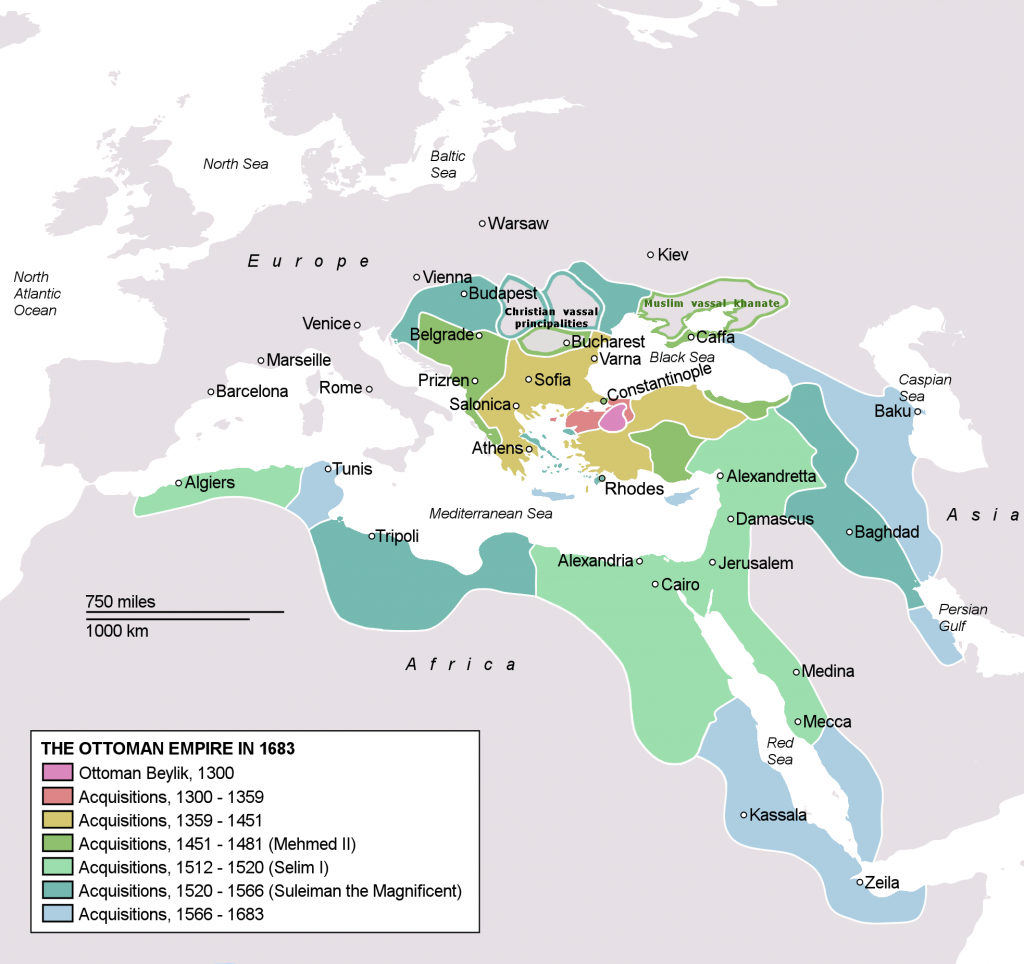The Ottoman Empire at Its Greatest Extent
Ottoman Reforms
War and Revolution Weaken the Ottoman Empire
Revelation 16:12
This archive displays the most recently added endnotes first. Click the first post, Revelation 16:12 Endnotes, to access each endnote in its order encountered in the text.
Ottoman Reforms
Beginning in 1839, the Ottoman Empire began to enact reforms for its citizens which the citizens of the Roman beast in the rest of Europe could only dream of.
“In the reform movements and activities of the nineteenth century two distinct trends can be discerned, between which there was continuous struggle. One derived from the Central European Enlightenment, and brought ideas which were welcome and familiar to authoritarian reformers. They too, like their Central European models, knew what was best for the people and did not wish to be distracted by so-called popular government from the business of applying it. The inert masses, accustomed by ancient tradition to follow and to obey, could not yet, according to this view, be entrusted with their own fate but had to be taught and commanded by those whose historic function it is to teach and to command — that is, the intellectuals and the solders.
The other view drew its inspiration from Western rather than Central Europe, and was inspired by doctrines of political and, to a lesser extent, economic liberalism. For the disciples of this trend, first in Turkey and then in other countries, the people had rights which were to be secured, along with the general advancement of the country, by means of representative and constitutional government. Freedom was seen as the true basis of Western power, wealth, and greatness. … The importation, adaptation, and in some measure application of these ideas [of individual freedom] constitute one of the major political developments of the nineteenth and early twentieth centuries.
“The first tentative experiments with consultative councils and assemblies, all appointed, date back to the early nineteenth century, when both in Turkey and in Egypt councils of this kind were convened to discuss such matters as agriculture, education, and taxes. In 1845 the Ottoman sultan even convened an assembly of provincial representatives, two to be chosen from each province, ‘from among those who are respected and trusted, are people of intelligence and knowledge, who know the requisites of prosperity and the characteristics of the population.’ Despite these fine qualifications the experiment led nowhere and was abandoned.”
Bernard Lewis, The Middle East: A Brief History of the Last 2000 Years, pp. 311-12.
War and Revolution Weaken the Ottoman Empire
However, war began to weaken the Empire. Uprisings in Ottoman-controlled holdings in Europe took place in the 19th century as they did in the rest of Europe against the Roman powers. The Ottomans began losing political power.
“The government’s problems of financial insolvency were now aggravated by those of internal revolt. Provoked by a bad harvest and the subsequent extortions of the imperial tax farmers, an insurrection against the local authorities erupted in Herzegovinia. It spread to Bosnia, where civil war soon raged between Crescent and Cross. Both Montenegro and Serbia … intervened with armed bands, and in the summer of 1876 the fire of revolt spread at the instigation of the rest to Bulgaria. Here in fact was the start of a Balkan revolutionary movement which was to lead, through the next generation, to one war after another and eventually to transform the whole face of the Balkan peninsula.”
Lord Kinross, The Ottoman Centuries: The Rise and Fall of the Turkish Empire, pg. 509.
“Serbia is called the ‘Peasant Nation.’ Its ancient native aristocracy was lost in the conquest by the Turks, and replaced with Musselmans [Muslims], who settled as conquerors in the country. … In 1876, excited by the revolt of Christians in Herzegovinia, Serbia declared war against Turkey. Conquered and overrun, she was saved by European intervention; but during the Russian invasion of Turkey in 1877 Serbia reopened the war. The Peace of Berlin [1878] gave her greater territory and complete independence …”
Merrick Whitcomb, A History of Modern Europe, pp. 271-272.
“In the autumn [of 1877], Europe was startled by the news of a great and decisive Russian victory over the Turks. On October 14 and 15 the Turks lost at one blow all the fruits of a long and brilliant series of victories in Armenia. On the 14th, [Russian] General Lazarov outflanked the right of the Turkish army … and the next day the Grand Duke Michael attacked the centre of the Turkish position with overwhelming force, while General Lazarov assaulted the rear. By 9 P.M. twenty-six battalions with seven pashas had surrendered with thirty-six guns. The Turkish stronghold on Mount Acolias was taken and the army cut in two. The right wing was compelled to lay down its arms, while … the left wing retreated … The spoil was great, including thousands of tents and standards, and immense quantities of ammunition. The remnant of … the army took up a strong position … before Erzeroum, from which it was driven in wild confusion on November 4 … On November 18, the famous fortress of Kars was taken by assault after a desperate conflict which raged for twelve hours. The Turks lost 5,000 in casualties, 300 cannon, and 10,000 prisoners.”
Edwin Emerson, Jr., A History of the Nineteenth Century, Year by Year, Vol. 3, pp. 1578-1579.
The Ottoman Empire at its Greatest Extent
At its greatest extent, the Ottoman Empire of the Turks extended from Algeria in the west to Azerbaijan in the east, from the border of Austria in the north to Yemen, Africa in the south.
